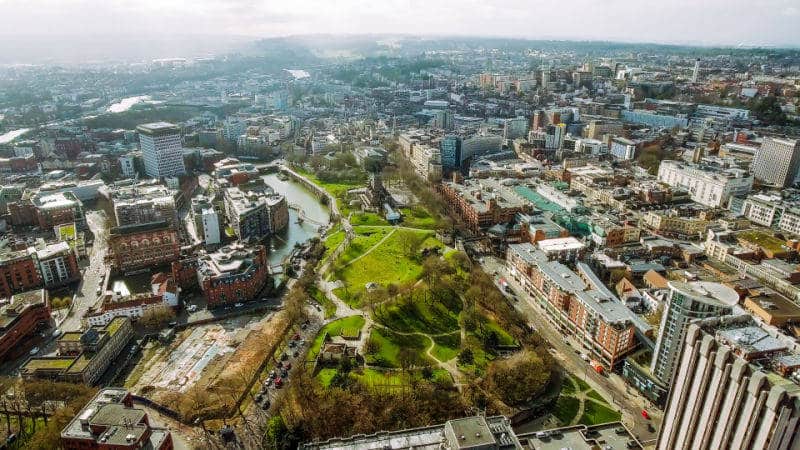Newsletter Signup - Under Article / In Page
"*" indicates required fields
September 15th 2022: Article updated to include comments from Harry Destecroix and to correct a mispelling of Science Creates.
The Golden Triangle region hosts much of the U.K.’s biotech innovation. However, there are many hubs emerging across the nation, with Bristol’s Science Creates network being one thriving example.
The U.K. hosts one of Europe’s leading biotech industries in terms of startup formation, scientific publications and investments.
“The U.K. punches well above its weight with respect to its R&D output,” said Uzma Choudry, an investment partner at the U.K. firm Octopus Ventures who built and leads its biotech and life sciences investment strategy.
“If you look at the biosciences and life sciences R&D output, it’s behind only the U.S. and China with respect to the quality of R&D and publications. For such a small country compared to the U.S. and China, that is impressive.”
The Golden Triangle vs emerging U.K. hubs
Most of the U.K.’s biotech innovation is being commercialized in the famous Golden Triangle region, which includes London and the academic heavyweights of Oxford and Cambridge. For example, the number of startups in the Golden Triangle grew by 44% between 2016 and 2020 compared to earlier in the decade. In the same time period, the rest of the country saw an average biotech startup growth of just 3%.
Nonetheless, the bustling Golden Triangle regions are facing a lack of lab space for setting up a biotech company, particularly in London. Meanwhile, many emerging hubs in the rest of the U.K. such as the city of Bristol in the South West are building up biotech ecosystems that can support entrepreneurial academics.
“Operating outside the Golden Triangle makes you hungrier, more tenacious and more energetic,” said Carolyn Porter, CEO of the Bristol-based cell therapy startup Cytoseek. “Sometimes in the Golden Triangle, people are a bit relaxed, but being outside that environment makes you work harder to be visible.”
Bristol’s biotech hub: forged by trailblazers
According to Choudry, history demonstrates that many biotech hubs are turbocharged by local entrepreneurs that hit major success and blaze a trail for others to follow. This means there is a clear guide for new entrepreneurs in the same region on how to navigate technology transfer processes and to protect their intellectual property.
One key example is the company Ziylo. The firm was set up in Bristol to develop synthetic molecules such as forms of insulin that can selectively activate themselves in the blood when glucose levels are high. The promise of this technology prompted Novo Nordisk to snap up the biotech for $800 million in 2018.
“I remember hearing about the deal in Oxford and everybody going ‘bloody hell, that’s a phenomenal deal,’” recalled Porter. “It bolstered the angel network and the openness to investing in the biotech sector, which frankly is an area that was underinvested and under-visible.”
In addition to shining the spotlight on the Bristol ecosystem for investors, one of Ziylo’s founders, Harry Destecroix, went on to set up the startup network Science Creates, which includes a venture fund in addition to two startup incubators in the center of Bristol. The aim was to make it easier for deeptech and biotech entrepreneurs to set up companies and navigate the local ecosystem.
“I thought then and still do now, that there is an enormous amount of potential in Bristol and the South West which needed active ecosystem building to help unlock more of its potential,” Destecroix explained. “First-hand, I saw many great discoveries that needed active support to help commercialize and deliver impact.”

Cytoseek’s journey to Science Creates
Cytoseek has lab space in Science Creates’ incubators, and develops synthetic proteins that can plug into cell therapies and give them extra functionalities such as making them better at killing cancer cells. However, the trajectory of the firm from its founding in 2017 to this point was anything but easy.
Cytoseek was spun out from an academic group in Bristol. The firm started off with lab space in the University of Bristol and grant support from the funding schemes Innovate UK and the UK Innovation & Science Seed Fund (UKI2S). After Porter jumped on board as CEO in January 2020, the company was plunged into uncertainty.
“Within six weeks of my first CEO position we had the COVID-19 pandemic, which was an interesting challenge,” said Porter. “At that time, the company was based in the University of Bristol and the university shut down. We faced a choice of either mothballing the whole company — then we wouldn’t have had a chance of raising more capital because there’s no work ongoing — or be really tenacious and find sites for us to continue to work.”
To keep its research alive, Cytoseek rented labs from other companies, including another biotech startup at the University of Bristol called Imophoron, which was still actively carrying out research on COVID-19 vaccines. To achieve this feat, the team had to load expensive lab equipment into their cars and carry it to new workspaces.
“My own car had a quarter of a million pounds of equipment driving around Bristol,” said Porter. “We set up the lab and kept going.”
As the University of Bristol and other sites began to reopen following pandemic lockdowns, Cytoseek worked from the university in addition to labs in Science Creates’ Unit DX incubator in Bristol. The plan had been to move to a second incubator under construction in Bristol’s Old Market area, but the opening was delayed until November 2021 due to disruption caused by the pandemic.
Cytoseek was the first tenant in the Old Market incubator when it opened, and the company closed a $4.5 million (£3.5 million) seed round last year led by Science Creates Ventures.
“We were able to show we were tenacious about moving forward and we’d managed to continue to de-risk the technology to get to a point where investors could see the potential in the immuno-oncology space,” explained Porter.
Science Creates uniting Bristol’s biotech ecosystem
The Bristol region has many strengths that contribute to a growing biotech ecosystem. For instance, hospitals in the region have hosted some of the first patients to be dosed with CAR-T cancer cell therapies. The zone is also home to the gene and cell therapy consultant firm eXmoor Pharma Concepts. In addition, the Science Creates initiative is helping a lot of these threads unite into a strong biotech ecosystem.
“I think Science Creates has a really good nucleating activity,” said Porter. “There are evangelists in the region and there’s been a growing angel community, which for de-risking early stage businesses — even in the Oxford ecosystem — is fundamental to getting companies out of the door.”
The Oxford biotech ecosystem has incubators, funds and advisors in abundance. However, Porter saw a relative lack of cooperation and more competition compared to Bristol’s biotech space.
“While there are still different groups in the Bristol ecosystem, I think things like the Science Creates initiative have created cohesion, momentum and visibility in the region,” she said.
Investors are also keenly aware of the opportunities present in emerging biotech hubs in the U.K. For example, the U.K.-U.S. venture capital firm Epidarex Capital has a fund dedicated to seeking out biotech innovations in relatively unexplored geographies such as the North of England and Scotland.
“Where there is an opportunity for European investors is that, while U.S. investors know Oxford, Cambridge and London really well, [the U.S. investors] don’t see opportunities from Warwick or Bristol or other areas,” said Choudry. “I think that gives us a competitive advantage.”
Development challenges in emerging hubs
While there are numerous advantages of setting up a biotech company in the U.K.’s emerging hubs, there are still bumps in the road. For example, capital and lab space is hard to come by, and available talent is often sucked up by the Golden Triangle.
“I think right now Bristol is a victim of its own success: having space,” said Porter. “What we need next is more regionally focused, larger funds.”
In addition, universities outside of the Golden Triangle often have to improve their support for entrepreneurs launching spinouts in terms of their technology transfer processes and funding support. The situation is no different in the Bristol ecosystem.
“Harry Destecroix showed the university what supporting activities like that was capable of delivering in terms of a return to the ecosystem and to them as shareholders,” said Porter. She added that Ziylo’s exit helped to improve the university processes in this pursuit, but there is still a long way to go.
Setting up shop in the U.K.’s biotech hubs
The journey for a biotech entrepreneur may be intimidating, especially if they are based outside of the Golden Triangle in the U.K. However, there are many pieces of advice for those setting up spin-out biotech companies.
“Building a startup can be a very lonely journey for CEOs and for founders,” said Choudry. “So find a co-founder: someone who you can sound out ideas with and who you can take this journey with. Find mentors or folks whether that’s people who’ve done it before. For example, another entrepreneur that’s now raising a Series B and would have experience that they can download to you.”
Destecroix echoed this sentiment, adding that entrepreneurs should “try and attend conferences and network where relevant for your business across the UK. Try and find local angels/investors who can help, as well as securing grant funding.”
Porter, meanwhile, emphasized the importance of Science Creates’ incubator location for Cytoseek’s operations. The fact that the incubators are inside Bristol’s city center is unusual even in the Golden Triangle, and boosts recruitment efforts.
“We really benefited from being in this environment: there’s a flowthrough of investors and of people,” said Porter. “Having a hub attracts employees when they walk into this place because they can feel there’s an energy and buzz. So finding a home to start with that you can build the other components on is quite important.”
Even though the biotech industry is embracing remote working more than ever, it pays to be part of local communities of biotech companies, particularly when sharing resources, networking, or sharing equipment.
“People in the community were good enough to lend us bits of kit,” said Porter. “That’s very difficult to do when you’re in a disseminated environment.”
Oncology R&D trends and breakthrough innovations







